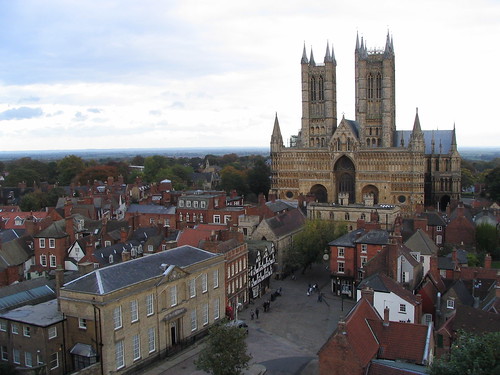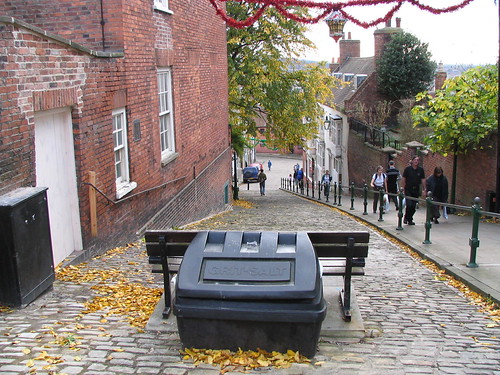Hi everyone! *waves* Remember me?
When last we saw our intrepid heroine, she had just returned from LDYS conference, where, frankly, a great time was had by all. Lincoln is a pretty neat town and I enjoyed my half day of roaming (sleeping bag in hand, I might add). The Cathedral had some great glass (although one of the rose windows was covered over for restoration) and I especially loved the serviceman's chapels. I maintain that the British are brilliant at commemorating wars (with special emphasis on the horrors thereof) and that we should take a lesson from their example. I'm really looking forward to Armistace Day and Remembrance Sunday to take part. People are already starting to wear their poppies. Ooops, I digress. Lincoln Castle is really walls with a Victorian prison and court inside. I like walls, though, and climbed up a rather tall tower to take pictures. However, my acrophobia failed me when it came to the walls themselves and I didn't venture further. Prisons are creepy and I loved reading for subtext in the exhibit that accompanies Lincoln's copy of the Magna Carta. Ahhh, a photo:

Lincoln Cathedral from aforementioned scary tower.
Did I mention that I was a bit disappointed because Lincolnshire is very flat and I like my English countryside green and hilly? I say flat, but there's this...mountain...that one has to climb to get up to the Cathedral and Castle (my Rough Guide says the downhill is reserved for, no joke, the proletariat):

The name of this street? Steep Hill. Heh. Snark.
Oh, and did I mention that they filmed parts of the upcoming Davinci Code movie in Lincoln Cathedral after being denied access to Westminster Abbey? Totally had me fooled with the "wall paintings" that turned out to be reproductions painted on canvas. Booooooo!
But, conference itself was also great. I saw Ryan and Heather again (yay!) and made new friends, was helpful in the kitchen and by moving for closure of debates whenever it seemed necessary (also got the WTF do you mean, "closure of debate" look a couple of times...stilly MUN language), helped rewrite a policy motion that never got debated and slept (rather well, oddly enough) under a table in a church hall. Seriously, though, it was great! I really wish I were here for longer so I could get more involved with LDYS. Came back Monday and had a great time with my random seatmates...there was much innuendo and we'd only just met eachother. Le sigh. Does it say anything about the journey when I tell you that I was supposed to be on the 11:02 train but ended up on the 8:30 am that was still sitting at the station when I got to Newark. (Oh, insert your own joke about having to change trains at Newark. I certainly have.)
This week, other than the little hissy fit about housing that I made partially better by cleaning my room, has been better than the last one. Oddly enough, by not doing any work all weekend, I seem to have done a better job on doing the readings for the week that's just finished. I'm rather proud, really. I didn't get through everything on time, but got a whole lot closer. International Law makes me want to cry because none of the conceptual stuff is sinking in and I feel dumb when people ask very brainy, complicated questions that I barely understand. I'm going to make sure that I do all the reading for next week and then talk to one of the profs. if I'm still feeling the same way. Also, we talked about pirates in International Criminal Law today. Our response? We kept making pirate noises to eachother. Aaaaaargh! I wish I'd dressed up for it.
One part of Joyce's "Nose to the Grindstone Week" was a day and a half spent at the National Theatre. Yesterday I was there from 1:30 until a show at 7:30, but was amazingly productive. I decided to give myself something to look forward to (not to mention a reason why I wasn't allowed to go home) by buying a ticket for the first preview of Coram Boy, because, frankly, nothing else was even remotely appealing. The verdict? OMG!!! It was absolutely amazing! However, since that analysis is not all that complete, I give you my official review. I wrote this, hopefully, for the Beaver (it's already been sent to the editor). I knew that he had given tickets to someone to do it, but I a) wanted to think about the experience and b) not let anyone else say something potentially bad about this amazing work. It would be cool to get published. It was also a great brain exercise. I'm not used to having to think that hard about the theatre I see, but I really enjoyed doing so. The title of this post is from the play, from Meshak, a character who I'm finding more and more interesting (both in the tragic and amazing senses) as time goes on. Right, to the review (and I'd love feedback on this!):
Coram Boy, Royal National Theatre
I’m afraid that I associate Handel’s Messiah with memories of a high school auditorium, somewhere in Indiana. I remember it lasting for a very long time and I remember the seats squeaking and the coats rustling as the audience reluctantly shuffled to their feet for the Hallelujah Chorus. For tonight’s rendition, however, I would have leapt to a standing position, had Coram Boy not just knocked me off my feet.
Coram Boy, now playing in the Royal National Theatre’s Olivier Theatre, is adapted from the book of the same name by Jamila Gavin and follows upon the His Dark Materials tradition of bringing modern “classics” of young adult literature to the National’s stage. In an effort to associate the new play with the success of the past, the posters for the play and the front cover of the book itself are both plastered with praise from Philip Pullman, author of the His Dark Materials trilogy. Frankly, it’s unnecessary; this work can and will be a raging success entirely on its own.
The plot of the play follows two major threads. First comes the story of Alexander Ashbrook (Anna Madeley and, later, Bertie Carvel), a young, noble, would-be composer. The other follows the so-called Coram Man, Otis Gardiner (Paul Ritter), a child slave dealer who turns a tremendous profit by promising desperate, young single mothers that their infants will be taken to Thomas Coram’s new Foundling Hospital in London. Infanticide, burials in the woods and dead babies (both with and without flesh on their bones) follow. The lives of our characters intertwine as we move between eighteenth century society’s darkest secrets and its shining achievements. Overseeing it all are Otis’ son Meshak (Jack Tarlton)—a dim-witted, scarred young man who proves himself capable of incredible acts of love—and the Gloucester Cathedral angel (Justine Mitchell) whom he worships.
The first act is both long and dark (although I suspect that the length will be tightened as the show’s run goes on). Nevertheless, the its events provide the vehicle for a tremendous showcase of talent. Ritter does a fantastic job with Otis, one of the play’s most interesting characters. He swings from promising young mothers that he will take care of their infants to burying the children in the woods in the next scene and is utterly believable in both cases. Abby Ford, as Alexander’s friend and fellow choirboy, has managed to capture the essence of a young teenage boy (all of the children, male or female, are played by girls in this production). It has been a very long time since I left an auditorium at the intermission feeling both disoriented and desperate for the second act.
The National Theatre’s promotional materials for Coram Boy state that this is a “tale of two orphans.” I would beg to disagree. The orphans in question don’t appear until the second act, when we are transported to London, eight years after the end of the first act. They’re also not particularly interesting, other than as metaphors for the deeper themes with which the play is so obsessed. This does not, I should add, preclude some great performances from Akiya Henry as Toby (a young black boy rescued from, and then practically returned to, slavery) and Anna Madeley (who happily reappears after being replaced by a “grown-up” version of Alexander) as Aaron.
There are some delightful moments and significant character developments, but the rather blah-ness of these two central characters in the second act is a bit typical. The first act left us emotionally raw. The much shorter second was left with the task of tying up loose ends and quickly making way for a happy ending that, yes, does portray the first performance of the ‘Messiah’ (Handel was one of the patrons of the Foundling Hospital and it was first performed in the Hospital’s chapel). I won’t say more, but I’m pretty sure that the tears onstage were just as genuine as those in the audience.
The performance that I attended was, in fact, the first preview and (hee!) the unofficial world premiere of Coram Boy. Understandably, there were kinks, most notably in missing costumes, but I don’t think that this detracted at all from the overall quality of the play. The set made use of the Olivier’s massive drum revolve [ed. that's like a normal revolve, except that it can also go up and down at the same time] and very simple furniture shifts to distinguish between scenes that ran from one to the next. Always present, however, is a pipe organ. It’s a constant reminder of both Meshak’s angel and the music that plays such an important role in both the story and the production. But, in general, the designers have used simple settings and lighting to great effect: it wasn’t until later reflection that I even realized that the sets had remained fairly constant throughout.
It is clear from the timing and the extra-reasonable £16 children’s tickets that Coram Boy is the National’s yearly answer to the pantomime. But don’t be deceived. This is a play that wallows in grown-up themes, ranging from poverty and infanticide to slavery and human trafficking. I suppose that what makes it a “children’s play” is the fact that Coram Boy has placed such a strong emphasis on storytelling, somewhat of a welcome break from pretentiously wordy, one-set dramas. This is an epic, produced on an epic scale and dealing with themes that are as relevant in our 21st century world as they were in 18th century England.
Anyone still there?
1 comments:
The play is fiction afterall, but I feel the need to point out these inaccuracies:
The first performance of the Messiah was given in DUBLIN, Ireland in a joint concert by the choirs of St Patrick’s Cathedral and Christchurch Cathedral. And there is NO WAY that it was composed in Coram Chapel.
The 20 strong choir for Coram Boy (mostly university music students), of which one is a Handel scholar, one an ex choral scholar at Christchurch Dublin and one is involved with the church Coram is buried in, have a good laugh/headshake at this every night!
However, Handel was a benefactor of the Coram Hospital and wrote the 'Foundlings Hospital Anthem' for them to sing.
Glad you enjoyed it,
Soprano, Coram Boy
Post a Comment